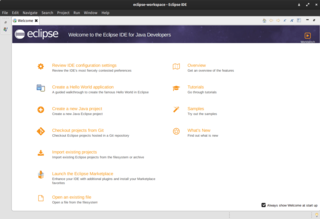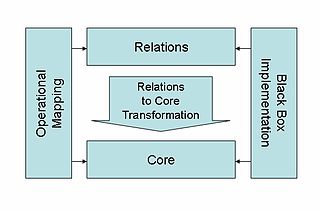This is a list about tools using the Eclipse Modeling Framework. [1]
This is a list about tools using the Eclipse Modeling Framework. [1]

The Meta-Object Facility (MOF) is an Object Management Group (OMG) standard for model-driven engineering. Its purpose is to provide a type system for entities in the CORBA architecture and a set of interfaces through which those types can be created and manipulated. MOF may be used for domain-driven software design and object-oriented modelling.

Eclipse is an integrated development environment (IDE) used in computer programming. It contains a base workspace and an extensible plug-in system for customizing the environment. It is the second-most-popular IDE for Java development, and, until 2016, was the most popular. Eclipse is written mostly in Java and its primary use is for developing Java applications, but it may also be used to develop applications in other programming languages via plug-ins, including Ada, ABAP, C, C++, C#, Clojure, COBOL, D, Erlang, Fortran, Groovy, Haskell, HLASM, JavaScript, Julia, Lasso, Lua, NATURAL, Perl, PHP, PL/I, Prolog, Python, R, Rexx, Ruby, Rust, Scala, and Scheme. It can also be used to develop documents with LaTeX and packages for the software Mathematica. Development environments include the Eclipse Java development tools (JDT) for Java and Scala, Eclipse CDT for C/C++, and Eclipse PDT for PHP, among others.
A platform-specific model is a model of a software or business system that is linked to a specific technological platform. Platform-specific models are indispensable for the actual implementation of a system.
Model-driven architecture (MDA) is a software design approach for the development of software systems. It provides a set of guidelines for the structuring of specifications, which are expressed as models. Model Driven Architecture is a kind of domain engineering, and supports model-driven engineering of software systems. It was launched by the Object Management Group (OMG) in 2001.
The Object Constraint Language (OCL) is a declarative language describing rules applying to Unified Modeling Language (UML) models developed at IBM and is now part of the UML standard. Initially, OCL was merely a formal specification language extension for UML. OCL may now be used with any Meta-Object Facility (MOF) Object Management Group (OMG) meta-model, including UML. The Object Constraint Language is a precise text language that provides constraint and object query expressions on any MOF model or meta-model that cannot otherwise be expressed by diagrammatic notation. OCL is a key component of the new OMG standard recommendation for transforming models, the Queries/Views/Transformations (QVT) specification.
The common warehouse metamodel (CWM) defines a specification for modeling metadata for relational, non-relational, multi-dimensional, and most other objects found in a data warehousing environment. The specification is released and owned by the Object Management Group, which also claims a trademark in the use of "CWM".

A metamodel is a model of a model, and metamodeling is the process of generating such metamodels. Thus metamodeling or meta-modeling is the analysis, construction, and development of the frames, rules, constraints, models, and theories applicable and useful for modeling a predefined class of problems. As its name implies, this concept applies the notions of meta- and modeling in software engineering and systems engineering. Metamodels are of many types and have diverse applications.
A UML tool is a software application that supports some or all of the notation and semantics associated with the Unified Modeling Language (UML), which is the industry standard general-purpose modeling language for software engineering.
VIATRA is an open-source model transformation framework based on the Eclipse Modeling Framework (EMF) and hosted by the Eclipse Foundation.
Model-driven engineering (MDE) is a software development methodology that focuses on creating and exploiting domain models, which are conceptual models of all the topics related to a specific problem. Hence, it highlights and aims at abstract representations of the knowledge and activities that govern a particular application domain, rather than the computing concepts.

ATL is a model transformation language and toolkit developed and maintained by OBEO and AtlanMod. It was initiated by the AtlanMod team. In the field of Model-Driven Engineering (MDE), ATL provides ways to produce a set of target models from a set of source models.

QVT (Query/View/Transformation) is a standard set of languages for model transformation defined by the Object Management Group.
A model transformation language in systems and software engineering is a language intended specifically for model transformation.
The Graphical Modeling Framework (GMF) is a framework within the Eclipse platform. It provides a generative component and runtime infrastructure for developing graphical editors based on the Eclipse Modeling Framework (EMF) and Graphical Editing Framework (GEF). The project aims to provide these components, in addition to exemplary tools for select domain models which illustrate its capabilities.

Eclipse Modeling Framework (EMF) is an Eclipse-based modeling framework and code generation facility for building tools and other applications based on a structured data model.
Generic Eclipse Modeling System (GEMS) is a configurable toolkit for creating domain-specific modeling and program synthesis environments for Eclipse. The project aims to bridge the gap between the communities experienced with visual metamodeling tools like those built around the Eclipse modeling technologies, such as the Eclipse Modeling Framework (EMF) and Graphical Modeling Framework (GMF). GEMS helps developers rapidly create a graphical modeling tool from a visual language description or metamodel without any coding in third-generation languages. Graphical modeling tools created with GEMS automatically support complex capabilities, such as remote updating and querying, template creation, styling with Cascading Style Sheets (CSS), and model linking.
SmartQVT is a unmaintained full Java open-source implementation of the QTV-Operational language which is dedicated to express model-to-model transformations. This tool compiles QVT transformations into Java programs to be able to run QVT transformations. The compiled Java programs are EMF-based applications. It is provided as Eclipse plug-ins running on top of the EMF metamodeling framework and is licensed under EPL.
Acceleo is an open-source code generator from the Eclipse Foundation that allows people to use a model-driven approach to building applications. It is an implementation of the "MOFM2T" standard, from the Object Management Group (OMG), for performing model-to-text transformation.